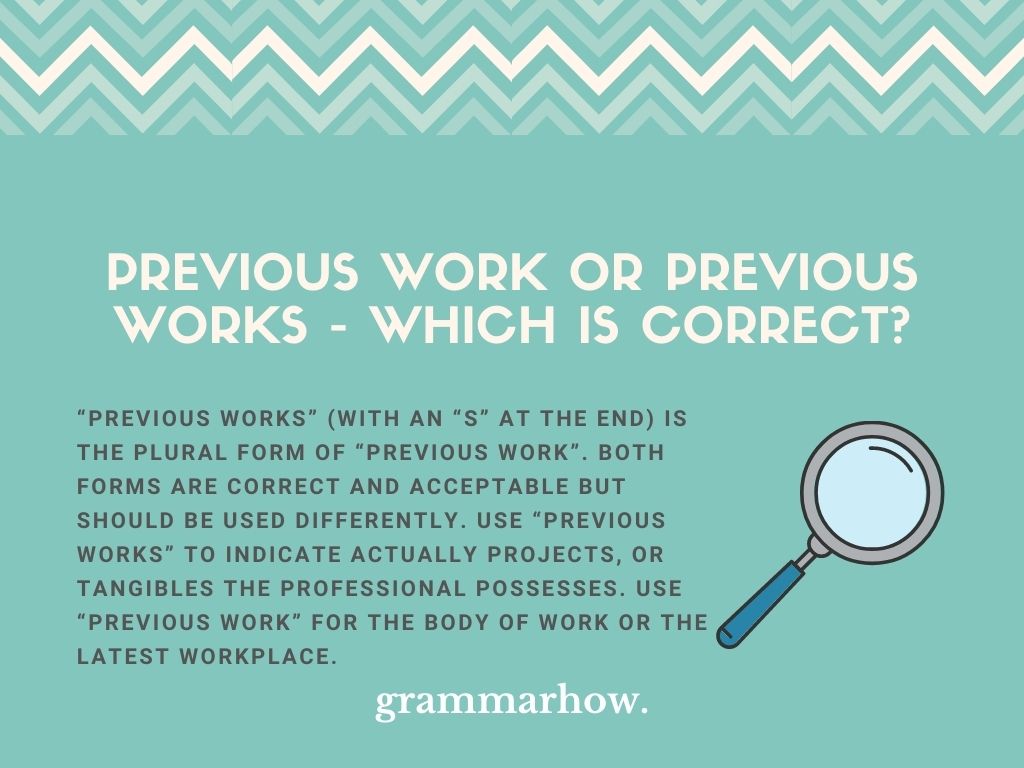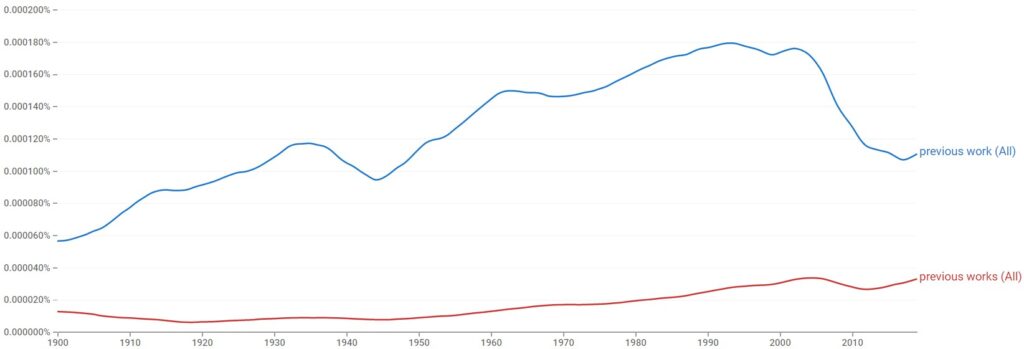When someone is describing their previous experience at work, should they say “Previous Work” or “Previous Works”? This is obviously a question about how and when to use the plural form, and we’re very curious to find out what’s right and wrong in this scenario.
Let’s dig in a little!
Previous Work or Previous Works – Which Is Correct?
“Previous Works” (with an “s” at the end) is the plural form of “Previous Work”. Both forms are correct and acceptable but should be used differently. Use “Previous Works” to indicate actually projects, or tangibles the professional possesses. Use “Previous Work” for the body of work or the latest workplace.

Take a look at the examples below, to grasp that difference:
- I left my previous work due to an unsafe environment.
- I forgot to pick up my previous works from the studio.
The examples illustrate the difference between “Previous Work” and “Previous Works”.
In the first sentence, the subject refers, to a job or a workplace, that they left due to a bad environment. In that scenario, “Work” in uncountable, and the correct form is “Previous Work” (in the singular form).
The second sentence discusses actual pieces of work, that the subject forgot to pick up from a studio. We’re talking about physical deliverables or projects that the professional has worked on, in the past.
The idea here is a portfolio, that showcases this person’s work. And in that scenario, “Previous Works” is the appropriate form to use.
Previous Work
“Work” as a non-countable noun relates to the idea of physical or mental activity meant to produce something. In this scenario, “Previous Work” is the correct form, because it agrees with the fact that no one is “counting” work – they’re just performing it in general.
Also, “Previous Work” can indicate someone’s body of work, like an author and their published materials, for example. Let’s take a look at some examples:
- I didn’t feel comfortable in my previous work and decided to quit.
- We read the previous work from Anna, and it was incredible.
- The previous proposed work needs to be further developed.
- Henry’s previous work as a painter garnered critical acclaim.
- Paula’s previous work is impressive, so I think we should hire her.
“Work” as stated in those sentences refers to a physical work location or someone’s body of work, meaning the pieces they’ve been able to produce throughout their careers. In those cases, “Previous Work” is the appropriate expression to use.
Previous Works
“Works” can be used as a countable noun, when reflecting actual pieces of work that have been produced. It could be intellectual, but usually involves some kind of physical or online product of the work that was developed. In that case, “Previous Works” is the correct form to use.
Take a look at some examples below, to see how this idea reflects in the sentences:
- Could I see your previous artworks?
- Do you have any previous works to add to your portfolio?
- What previous works are you planning on showcasing?
- The previous works shown in the magazine weren’t nearly as good as these.
- George’s previous work was quite impressive, and I can’t wait to see what he’ll do next.
Which Is Used the Most?
Which one of those forms is used more often, “Previous Work” or “Previous Works”? Let’s look at the graph from Google Ngram Viewer below.

Although those expressions indicate slightly different things, we were curious to find out which was used more. “Previous Work”, the singular (or non-countable) form appears with much more frequency than, “Previous Works”, in the plural form.
Although the usage of “Previous Work” has oscillated quite a bit over the years, it’s always been the prevalent one. We think it makes sense, considering this form has a general use – as opposed to “Previous Works” which is much more restricted and specific.
Final Thoughts
Both “Previous Work” and “Previous Works” are acceptable and could be used. You just have to choose between them, based on what you need to convey. Use “Previous Works” when referring to items, or objects that are part of the subject’s work. And “Previous Work” for every other situation.

Martin holds a Master’s degree in Finance and International Business. He has six years of experience in professional communication with clients, executives, and colleagues. Furthermore, he has teaching experience from Aarhus University. Martin has been featured as an expert in communication and teaching on Forbes and Shopify. Read more about Martin here.
